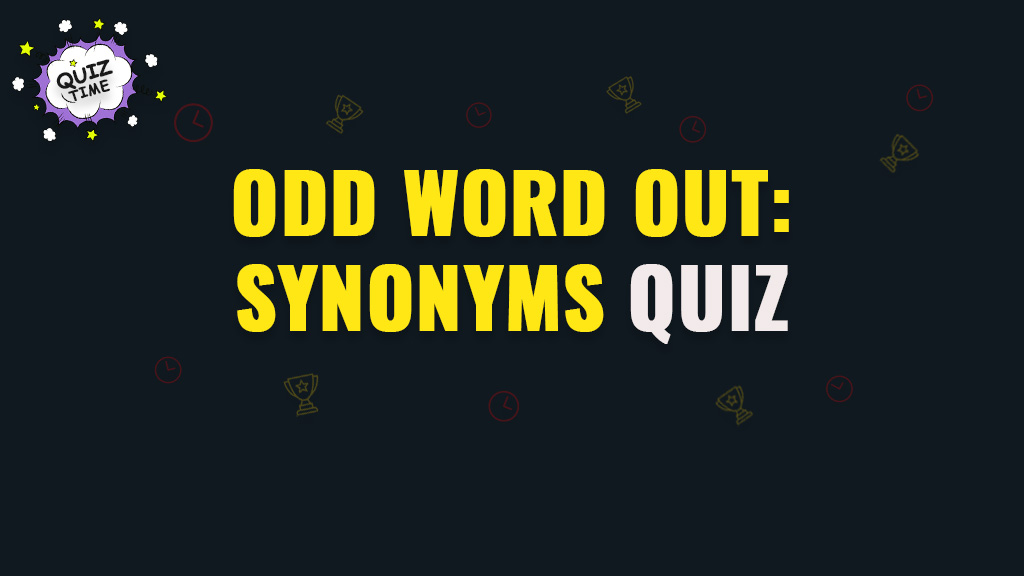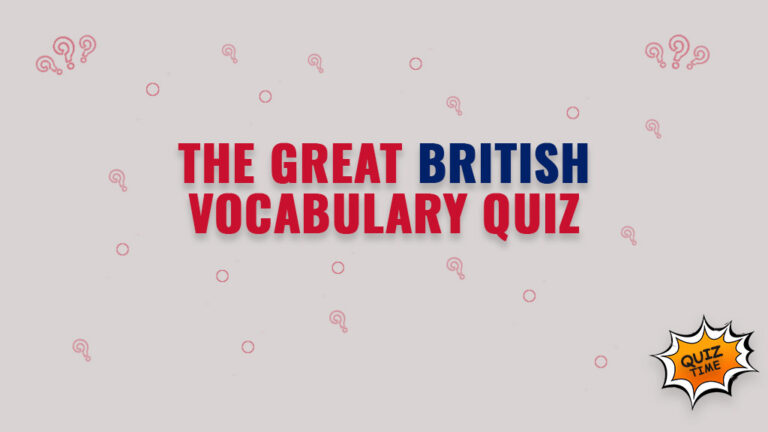❤️It's Trivia, but Sweeter❤️
Odd Word Out: Synonyms Quiz

Synonyms play a crucial role in the English language, allowing speakers and writers to express themselves in varied ways while maintaining the same meaning. Understanding synonyms not only enhances communication but also improves vocabulary, helping individuals articulate thoughts more effectively. A quiz designed to identify odd words out based on synonyms tests the depth of one’s knowledge of words and their meanings. This type of quiz helps to strengthen linguistic abilities by prompting participants to differentiate between words with similar meanings, offering a fun yet educational challenge.
The English language is rich with words that share similar meanings, known as synonyms. These words provide flexibility in expression, allowing speakers to avoid redundancy and add variety to their language. For instance, words like “happy,” “joyful,” and “cheerful” are synonyms, but each carries subtle nuances. “Happy” is often a general term used for expressing contentment, while “joyful” might indicate a higher level of happiness, sometimes even exuberance. “Cheerful,” on the other hand, might describe a more consistent or visible outward expression of happiness.
Learning to recognize synonyms improves the ability to understand text in its various contexts. Often, when reading literature, news articles, or academic papers, encountering unfamiliar words can be intimidating. However, knowing synonyms allows individuals to infer the meaning of these words, making it easier to grasp the overall message. For example, if someone knows the meaning of the word “swift,” they can understand that it refers to something fast, even if they have never encountered the word “rapid” before.
One of the most effective ways to test and reinforce one’s understanding of synonyms is through quizzes. A quiz forces participants to think critically about word meanings and apply their knowledge in real-time. By providing multiple options for each question, quizzes engage participants and help them sharpen their reasoning skills, particularly in the context of vocabulary. The concept of identifying the “odd word out” takes the quiz a step further, challenging individuals to recognize which word in a set of synonyms does not belong. This exercise enhances one’s ability to discern subtle differences between words with similar meanings.
The benefits of synonym quizzes extend beyond improving vocabulary. They can also sharpen one’s ability to comprehend language and recognize patterns in word usage. For example, understanding the context in which a word is used can help in choosing the most appropriate synonym for that situation. For instance, when describing a person’s emotional state, the synonym “joyful” might be more fitting than “cheerful” when trying to convey an intense sense of happiness. This distinction could be critical in literature, where the choice of words helps set the tone and atmosphere of a scene.
Another important aspect of synonym recognition is its application in writing. Whether for creative writing, professional communication, or academic purposes, the ability to use a variety of synonyms adds richness and depth to one’s work. It helps avoid monotony and makes the writing more engaging. Instead of using the same word repeatedly, a writer can select synonyms that provide slight variations in meaning, making their work more vibrant. For instance, instead of saying “the house was big” repeatedly, a writer can use “spacious,” “vast,” or “immense” to convey different shades of meaning.
The process of selecting the correct synonym can also depend on factors such as tone, formality, and connotation. Some words are more suitable for casual conversations, while others might be more formal or academic. Additionally, certain synonyms carry positive or negative connotations. For example, while both “brave” and “bold” describe courage, “bold” can sometimes suggest a certain level of audacity, while “brave” often carries a more neutral or even heroic connotation. Understanding these nuances enables better communication, ensuring that words are chosen with their appropriate meanings and contexts in mind.
Synonym quizzes also serve as excellent learning tools. They can help language learners improve their English skills by encouraging them to explore and remember words that share similar meanings. For non-native speakers, building a strong vocabulary is an essential step in becoming fluent. The ability to understand and use synonyms allows learners to better express themselves and understand others, whether in written or spoken form. Furthermore, mastering synonyms aids in passing English proficiency exams, where a rich vocabulary is often essential for achieving high scores.
In addition to vocabulary expansion, synonym quizzes promote critical thinking. By selecting the odd word out, participants must evaluate the relationship between words and determine which one does not fit within the group. This requires a deeper understanding of word meanings and an ability to think analytically. This type of cognitive exercise can be applied to other areas of learning, helping to improve memory retention and problem-solving skills.
For those interested in advancing their language skills, regularly engaging with synonym quizzes can be a valuable practice. Whether it’s through online platforms, mobile apps, or paper-based worksheets, these quizzes offer an interactive and enjoyable way to expand one’s vocabulary. Many educational websites and language-learning apps feature synonym exercises as part of their curriculum, allowing individuals to practice at their own pace. These quizzes also provide immediate feedback, helping learners identify areas where they may need further improvement.
The importance of synonym knowledge extends to various professional fields, including writing, teaching, marketing, and even public speaking. For writers, having a strong command of synonyms allows them to craft more compelling and diverse content. For educators, it enhances the ability to explain concepts and ideas more clearly to students. Marketers can use synonyms strategically to appeal to different audiences, ensuring their messages are engaging and persuasive. In public speaking, choosing the right synonyms can make speeches more dynamic and memorable, capturing the attention of listeners and conveying the speaker’s message with clarity and impact.
Additionally, synonym recognition is crucial in translating texts. Translators often have to choose synonyms that best capture the intended meaning of a word in the source language while considering the context and target language’s nuances. A deep understanding of synonyms allows translators to produce more accurate, natural-sounding translations that preserve the essence of the original text.
Synonym quizzes offer a fun and engaging way to improve one’s command of language, enhancing vocabulary, comprehension, and critical thinking. They provide valuable opportunities for learners to engage with language actively, reinforcing the meaning of words and their relationships to one another. By distinguishing between words that share similar meanings, individuals can sharpen their linguistic skills and apply them effectively in both written and spoken communication. Whether for educational purposes or personal enrichment, synonym quizzes contribute to a deeper understanding of language, offering both enjoyment and learning in the process.
In conclusion, synonym quizzes are more than just a fun exercise; they are an important tool for improving language skills and vocabulary. The ability to recognize and correctly use synonyms is essential for effective communication, and quizzes help test and expand this knowledge in an interactive manner. Engaging with these quizzes allows individuals to understand the subtle nuances between words and their meanings, enhancing their linguistic abilities and empowering them to communicate more fluently and confidently.



